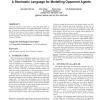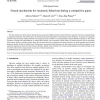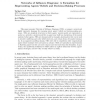16 search results - page 1 / 4 » A stochastic language for modelling opponent agents |
ATAL
2006
Springer
13 years 8 months ago
2006
Springer
There are numerous cases where a reasoning agent needs to reason about the behavior of an opponent agent. In this paper, we propose a hybrid probabilistic logic language within wh...
ATAL
2008
Springer
13 years 6 months ago
2008
Springer
The application of reinforcement learning algorithms to Partially Observable Stochastic Games (POSG) is challenging since each agent does not have access to the whole state inform...
NN
2006
Springer
13 years 4 months ago
2006
Springer
Previous studies have shown that non-human primates can generate highly stochastic choice behaviour, especially when this is required during a competitive interaction with another...
ATAL
2004
Springer
13 years 10 months ago
2004
Springer
This paper investigates a relatively new direction in Multiagent Reinforcement Learning. Most multiagent learning techniques focus on Nash equilibria as elements of both the learn...
JAIR
2008
13 years 4 months ago
2008
This paper presents Networks of Influence Diagrams (NID), a compact, natural and highly expressive language for reasoning about agents' beliefs and decision-making processes....



